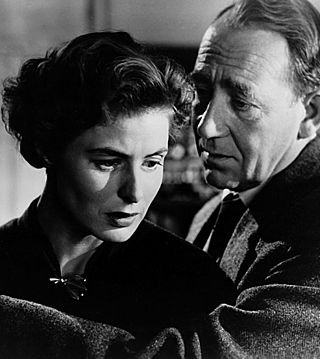
Mathias Wieman was a German stage-performer, silent-and-sound motion picture actor.

Scandal at the Fledermaus is a 1936 German comedy film directed by Herbert Selpin and starring Viktor de Kowa, Maria Andergast and Adele Sandrock. It was shot at the Terra Studios in Berlin. The film's sets were designed by the art director Erich Czerwonski. It was partly shot on location in London. It is also known by the alternative title Scandal Over Mary.
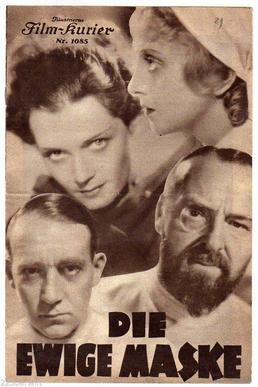
The Eternal Mask is a 1935 Austrian-Swiss drama film directed by Werner Hochbaum and starring Peter Petersen, Mathias Wieman and Franz Schafheitlin. The film was amongst the best ten foreign films of the year judged by the 1937 American National Board of Review of Motion Pictures. It also ran in competition at the 3rd Venice International Film Festival.

Anna Favetti is a 1938 German romantic drama film directed by Erich Waschneck and starring Brigitte Horney, Mathias Wieman and Gina Falckenberg. The screenplay was written by Walter von Hollander, adapted from his own novel Licht im dunklen Haus. It was made at the Babelsberg Studios in Potsdam. Location filming took place in Italy and Switzerland. The film's sets were designed by the art director Gustav A. Knauer.
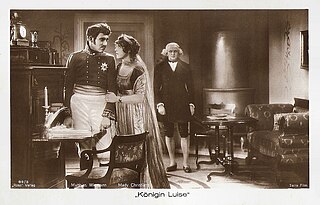
Queen Louise is a German silent historical film directed by Karl Grune and starring Mady Christians, Mathias Wieman, and Anita Dorris. It was released in two separate parts slightly less than a month from each other in December 1927 and January 1928. It commenced a series of historical epics directed by Grune. It was shot partly at the Terra Studios in Berlin. The film's sets were designed by the art director Hans Jacoby.
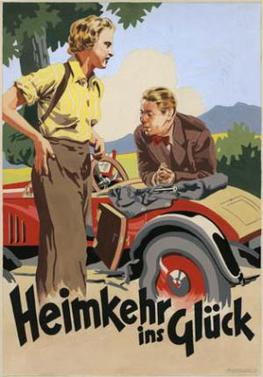
Homecoming to Happiness is a 1933 German comedy film directed by Carl Boese and starring Luise Ullrich, Paul Hörbiger and Heinz Rühmann. It was shot at the EFA Studios in Berlin's Halensee area. The film's sets were designed by the art director Franz Schroedter. Alessandro Blasetti directed an Italian remake L'impiegata di papà in 1934.

The Burning Secret is a 1933 Austrian-German drama film directed by Robert Siodmak and starring Alfred Abel, Hilde Wagener and Hans Joachim Schaufuß. It was based on the novella of the same title by Stefan Zweig. It was released by the German branch of Universal Pictures. It was shot at the EFA Studios in Berlin and on location around Ascona in Switzerland. The film's sets were designed by the art director Robert A. Dietrich.

Don't Promise Me Anything is a 1937 German comedy film directed by Wolfgang Liebeneiner and starring Luise Ullrich, Viktor de Kowa and Heinrich George. It was partly shot at the Grunewald Studios in Berlin.The film's sets were designed by the art directors Karl Weber and Erich Zander. The Berlin premiere took place at the Gloria-Palast. In 1950 Liebeneiner remade the film as When a Woman Loves with Hilde Krahl and Johannes Heesters in the lead roles.

Suburban Cabaret is a 1935 Austrian musical drama film directed by Werner Hochbaum and starring Mathias Wieman, Luise Ullrich and Oskar Sima. It was shot at the Sievering Studios in Vienna. The film's sets were designed by the art director Alfred Kunz. It is based on the play Der Gemeine by Felix Salten.

Regine is a 1935 German drama film directed by Erich Waschneck and starring Luise Ullrich, Anton Walbrook and Olga Tschechowa. It was shot at the Grunewald Studios in Berlin. The film's sets were designed by Otto Erdmann and Hans Sohnle.
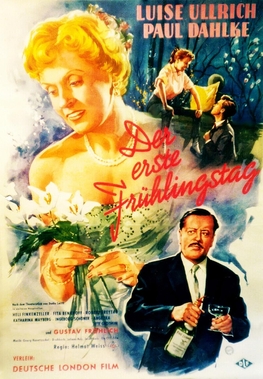
The First Day of Spring is a 1956 West German comedy film directed by Helmut Weiss and starring Luise Ullrich, Paul Dahlke and Ingeborg Schöner. It was based on the 1935 play Call It a Day by the British writer Dodie Smith. It was made at the Spandau Studios in Berlin. The film's sets were designed by the art directors Mathias Matthies and Ellen Schmidt. It premiered at the Marmorhaus in West Berlin.
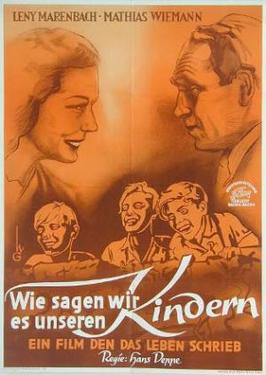
How Do We Tell Our Children? is a 1949 German comedy film directed by Hans Deppe and starring Leny Marenbach, Mathias Wieman and Hilde Körber. The film was made by the major German studio UFA in 1944, but was not released until several years after the end of the war.

Ripening Youth is a 1955 West German drama film directed by Ulrich Erfurth and starring Adelheid Seeck, Maximilian Schell, and Albert Lieven. It was shot at the Göttingen Studios in Göttingen. The film's sets were designed by the art director Alfred Bütow.

The Rainer Case is a 1942 German drama film directed by Paul Verhoeven and starring Luise Ullrich, Paul Hubschmid and Karl Schönböck.

Freight from Baltimore is a 1938 German drama film directed by Hans Hinrich and starring Hilde Weissner, Attila Hörbiger, and Hans Zesch-Ballot. Interiors were shot at the Tempelhof Studios in Berlin. The film's sets were designed by the art directors Carl Böhm and Erich Czerwonski. It was partly shot on location at the Port of Hamburg.

Dreaming is a 1944 German historical musical drama film directed by Harald Braun and starring Hilde Krahl, Mathias Wieman and Friedrich Kayssler. It portrays the lives of the pianist Clara Schumann and her composer husband Robert Schumann.

Ways to a Good Marriage is a 1933 German drama film directed by Adolf Trotz and starring Olga Tschechowa, Alfred Abel and Hilde Hildebrand. It was shot at the EFA Studios in Halensee in Berlin. The film's sets were designed by the art directors Heinz Fenchel and Botho Hoefer. The film was based on the ideas of the sexologist Theodore H. Van de Velde and was in the tradition of the enlightenment films of the Weimar Republic. Although his work had already been forbidden by the new Nazi regime, it was not formally banned until 1937 despite protests by Nazi students in Kiel who were successful in having the film pulled from cinemas there.

I Love You is a 1938 German romantic comedy film directed by Herbert Selpin and starring Viktor de Kowa, Luise Ullrich and Olga Limburg. It was shot at the Johannisthal Studios in Berlin. The film's sets were designed by the art directors Karl Weber and Erich Zander. It is in the style of a screwball comedy, inspired by the story of Adam and Eve.


















